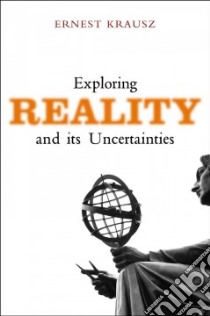- Libreria
- >
- Libri in lingua
- >
- Filosofia
- >
- Filosofia
Exploring Reality and Its Uncertainties - 9781845193508
Un libro in lingua di Ernest Krausz edito da Intl Specialized Book Service Inc, 2010
- € 35.20
- Il prezzo è variabile in funzione del cambio della valuta d’origine
"This book is an ambitious and impressive project. It examines the concept of reality through the lens of philosophy, sociology and scientific discourse. Ernest Krausz has managed to convey the essence of some complex ideas with elegance and efficiency. The book will appeal to readers who have an interest in science and philosophy and wish to think critically and broadly about the nature and limits of human understanding."-Stephen Miller, Emeritus Professor of Social Research, City University, London
"The human sciences, like all sciences, aim to understand, explain and where possibleûpredict. Professor Krausz addresses our attempts to explore social realityûwhich is both normative and a human construct. Predicting known and unknown unknowns is notoriously difficult. This is a fascinating area and he is a deft and learned guide.-Julius Gould, Professor Emeritus of Sociology, University of Nottingham
Using the combined tools of science, philosophy and the social sciences, the author sets out to explore the numerous facets of what we understand reality to mean. Close attention is given to the human side, especially to the individual experience of reality as manifested through personality, cognitive power, self-consciousness, and rationalistic and communicative endowments. This micro analysis is contrasted with a macro world view, encompassing our understanding of, and observation of, the outer edges of the universe, and how different levels (scientific and lay) of understanding impact on our relative perception of this particular reality.
Three pivotal arguments sustain the micro/macro examination parameters outlined above. First, is the need to view reality in terms of uncertainty. We perennially encounter uncertainty since reality is riddled through with chance, even in the case of deliberate choice of action ostensibly based on rationality, yet unavoidably affected by chance. Second, the limits of knowledge and constant uncertainty means that mankind must always live with the unknown and the unpredictable. Third, it is the human being, whether scientist or layperson, who creates the knowledge and its application to the experience of life, which in turn contributes to the creation of new realities.
These complex and infinite processes are difficult to fathom at the personal level, and fraught with challenges for scientists, philosophers and social scientists. But given the centrality of reality to our everyday experience and social intercourse - for the individual has to Face the world, interact with other people and survive - its importance cannot be underestimated. Ernest Krausz provides the philosophy platform to analyze the complex social interactions of human beings as they wrestle with the reality of everyday life, yet observe the vastness and uncertainty of their galaxy and beyond.
Informazioni bibliografiche
- Titolo del Libro in lingua: Exploring Reality and Its Uncertainties
- Lingua: English
- Autore: Ernest Krausz
- Editore: Intl Specialized Book Service Inc
- Collana: (Hardcover)
- Data di Pubblicazione: 01 Gennaio '10
- Genere: PHILOSOPHY
- Argomenti : Reality Knowledge, Theory of Knowledge, Sociology of
- Pagine: 133
- Dimensioni mm: 228 x 152 x 12
- ISBN-10: 1845193504
- EAN-13: 9781845193508


